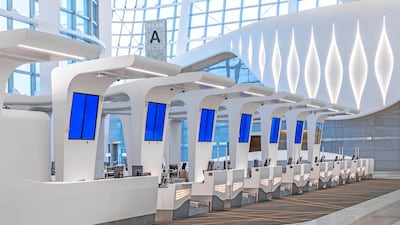Abu Dhabi International Airport has introduced the latest biometric systems at its new Terminal A that aim to offer passengers a faster and smoother journey to their gate.
Passengers can now get from the kerb outside the terminal to their gate in 12 minutes, thanks to advanced airport technologies and streamlined processes, said airport officials.
The self-service baggage drop-off kiosks take 30 seconds, clearing immigration procedures takes 10 seconds and flight boarding at the gate requires three seconds, Andrew Murphy, chief information officer at Abu Dhabi Airports, said during a media tour of the 742,000 square-metre terminal.
That compares with three immigration procedures that would take about a minute at the old terminal, he said.
“From a passenger experience perspective, passengers really enjoy the seamless nature of it. It allows you to get through the airport faster and then enjoy more time in retail or at the lounge and enjoy the whole experience,” Mr Murphy said.
Passengers worldwide are increasingly adopting the use of smart technologies to smooth choke-points along the airport journey, according to a September report by SITA, an IT provider for the air transport industry.
When asked about comfort levels with biometric identification throughout the airport journey, passengers scored an average of 7.36 out of 10 this year, up from 7.26 last year, reflecting rising demand for a smoother airport experience using technology, SITA said in its Passenger IT Insights report.
“When planning travel, cost is just one of the factors affecting travellers' willingness to book flights. Experience at the airport has become fundamental to passengers’ decision-making, and travellers are telling the industry loud and clear: the more they are subjected to clunky and inefficient processes, the more likely they are to consider other options,” David Lavorel, chief executive of SITA, said.
“Passengers are pointing to a clear way forward for the industry: now more than ever they recognise smart technologies as key to streamlining travel.”

Terminal A currently has five main biometric touchpoints. These include auto-enrolment, self-service check-in and bag drop, e-gates, immigration counters and aircraft boarding gates.
These will expand to nine touchpoints next year, extending to retail areas and airport lounges that passengers can opt into through a loyalty scheme, according to Mr Murphy. This would allow them to use their biometric profile for smoother experiences at duty-free shopping or when renting a car, for example, he said.
The expansion of biometric touchpoints around the terminal will also include adding more check-in desks as well as solutions for connecting flights.
There are currently 14 self-service bag-drop units that are mainly used by home carrier Etihad Airways. There are also 17 biometric boarding gates at the terminal.
More biometric counters for check-in and boarding will be available for passengers using other airlines at the terminal in 2024, he said.

Abu Dhabi Airports works with immigration authorities and other government entities to collect the necessary biometric data of passengers when they enter the country.
“We don't at any point take the data, we leave the data with them, but we use it for operational purposes for safety and security,” Mr Murphy said.
The auto-enrolment process applies to all UAE nationals, UAE residents and any traveller who has passed through any airport in the country over the last seven years, he said.
It will enable passengers to check-in online and use the self-serve desk at the terminal that will detect their biometrics through facial recognition.
At immigration, the system does all the necessary checks on visa and data verification.
“If all your paperwork is correct and in place, then you just simply pass straight through, there is no passport and no boarding passes,” Mr Murphy said.
“Your facial biometrics takes you through the whole journey.”
Abu Dhabi Airports worked with four technology companies to facilitate the biometrics services at the terminal, according to the executive.
Next50, an Abu Dhabi-based industrial AI company, was the systems integrator.
Aviation industry IT provider SITA was also part of the project.
Idemia provided the facial and iris recognition technologies, while Embross provided the self-service bag drop-off units.
The new terminal has a capacity to serve up to 45 million passengers a year and handle 11,000 passengers per hour.
The 28 airlines operating at the terminal together serve 117 destinations. The terminal can receive 79 aircraft at any one time.


